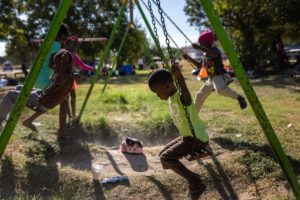
According to the International Organization for Migration, this week dozens of children with non-Haitian passports were sent to Haiti as part of the US government’s massive deportation operation.
The U.S. deported a total of 1,424 people to Haiti, more than 170 of them are children, of which 41 hold foreign citizenship. Although their parents may be Haitian nationals, at least 30 children have Chilean passports, 9 have Brazilian passports and 2 have Venezuelan passports.
Haitian Foreign Minister Claude Joseph stated, “we are asking for solidarity in the region. I spoke with my ambassador in Brazil, and she said that the Brazilians are willing to accept them back with their families.” He pledged to speak with other regional governments whose citizens are among the deportees.
Chile’s immigration authority said that children born in the country or with permanent residency would be welcomed back. The US Department of Homeland Security has been ramping up deportation flights to Haiti, as the Biden administration struggles with an increase of thousands of Haitian migrants at the US-Mexico border.
Daniel Foote, the US special envoy for Haiti, resigned from his post in protest over the deportations. In a letter, he stated that he would “not be associated with the United States inhumane, counterproductive decision to deport thousands of Haitian refugees,” citing ongoing humanitarian crises in the impoverished Caribbean nation.
Haiti is still reeling from their president’s assassination this summer as well as a 7.2 magnitude earthquake earlier this year that left over 2,000 people dead. According to UNICEF, 2 out of 3 Haitian migrants who have been deported from the U.S. are women and children, including newborn babies with specific needs. Henrietta Fore, executive director of the children’s agency stated, “When children and families are sent back without adequate protection, they find themselves even more vulnerable to violence, poverty and displacement — factors that drove them to migrate in the first place.”

Recent Comments